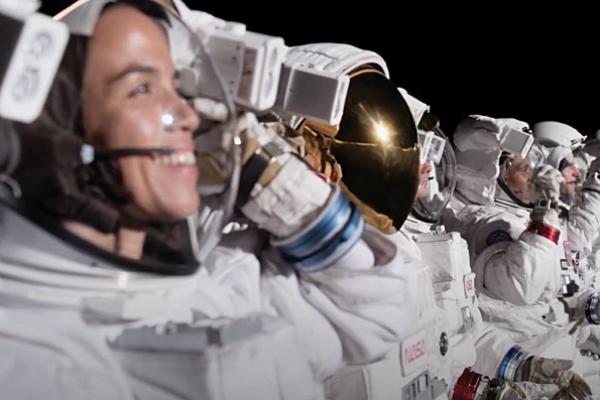ONE DOES NOT need to look hard to find a new myth forming about the great beyond. The narrative is that space travel will solve our woes—specifically the woes of racial capitalism. And this myth is appearing everywhere, in reality and fiction.
Take, for example, billionaire Richard Branson’s comments before Virgin Galactic’s suborbital mission in early July.
“Imagine a world where people of all ages, all backgrounds from anywhere, of any gender, or any ethnicity have equal access to space,” Branson told the press. “And they will in turn, I think, inspire us back here on Earth.”
Branson and fellow billionaire Jeff Bezos are in a 21st century space race, trying to justify their extreme spending to commercialize the cosmos with the idea that space travel can dissolve a litany of struggles.
The new space race is not so different from the first—the winner advances their power and reach. Between the 1950s and 1970s, the United States and the Soviet Union raced to space, then to the moon, largely for the same reason. The U.S., it might be said, won the space race by being the first to the moon (and we are still the only nation to have ever put people on the moon).
But what if things were different? This is the question explored by For All Mankind (Apple TV+), which released its second season in April. It is an exploration of a world in which the Soviets win the race to the moon, thereby extending the space race in perpetuity. The first season takes place in the ’70s, the second jumps to 1983, and the decade-jump trend will continue for all seven seasons, according to the creators.
There is much to like about the show. The concept itself is intriguing. The visuals are immense—who doesn’t love watching rocket ships blast off and land on the lunar surface? The acting is superb. The portrayals of Ed Baldwin, Molly Cobb, Gordo Stevens, and Ellen Wilson (by Joel Kinnaman, Sonya Walger, Michael Dorman, and Jodi Balfour, respectively) are filled with the complexity and joy of being human.
The show relishes—as it should—opportunities to make changes to the historical record. Most of these are fun and frivolous—John Lennon lives! Ted Kennedy becomes president! Others serve to advance current left-of-center commitments to diversity—’70s NASA is racially diverse and gender inclusive!
But where one might expect a retroactive look at the United States to offer nuance and critique, the show never fails to advance the idea that capitalism is good, and even when it isn’t, communism is worse.
Among the implications of this narrative: Because of space travel, electric cars would be normal in 1983 (a small nod that the climate crisis is averted), the United States leaves Vietnam earlier than in reality, and an undocumented immigrant is welcomed by her colleagues in the Reagan administration.
While the diverse casting is to be applauded, even this displays the type of diversity that capitalism is willing to achieve: The show has a number of gay, Black, brown, and female characters, but it is dominated mostly by straight, cis, white men. It is the type of diversity we see in “multiracial churches” and “diverse businesses” with all-white leadership.
The willingness to embrace fictional diversity (within government, to be clear), but an unwillingness to deal with the tensions that would follow, is maybe the farthest stretch on the show.
In one scene, astronaut Danielle Poole, who is Black, confronts her friend and supervisor Ed Baldwin about the lack of diversity among NASA’s space missions and requests she be made the lead of a mission. Baldwin defends NASA in the way white people often do.
“You have to understand, these things take time,” he whines. “We’ve dealt with this issue,” he insists, unable to name the issue.
And yet, minutes later, Baldwin demands that Poole lead Apollo-Soyuz—a mission NASA leadership deems useless, unachievable, and purely performative—in the name of equity. Meanwhile, he takes the most prestigious mission for himself. None of this is presented by the writers as ironic—if anything, Baldwin appears praise-worthy for giving his colleague a junk mission.
In the end, Apollo-Soyuz saves both countries from war. But all these scenes reveal something about how For All Mankind envisions racial equity is achieved: Black people are supposed to advocate for themselves, make the most of the junk given to them, and save the world.
The show’s diverse characters rarely have experiences realistic to the United States in the ’70s and ’80s. One is skeptical—given the treatment so far—that the HIV/AIDS crisis will be a significant plot point for the gay characters in season three even though it’s set in 1995, a year in which an estimated 50,000 people with AIDS died in the U.S.
The question is not whether For All Mankind is willing to portray history correctly in a surgical sense, but whether it is willing to portray it accurately, or if it wants to feed the broader myth of space travel. For All Mankind is not yet great fiction, though it has the potential.
Exploring space travel through fiction provides immense possibilities for reflection for those of us bound to terra firma, as proven by Afrofuturistic works and even pop culture like Star Trek. Great fictions can teach us about reality, asking us to consider and correct our course as we aim to become like—or unlike—the future their authors portray.
To make seasons three through seven better than the first two, For All Mankind’s writers will have to seriously grapple with the sins of the United States, racial capitalism, and colonialism. It will have to reverse course on the myth that an expanse to lunar and celestial bodies will solve the climate crisis, inspire peace, or create an inclusive country.
Otherwise, the show will simply peddle the myth that Bezos, Branson, and our capitalist overlords are attempting to sell.

Got something to say about what you're reading? We value your feedback!






